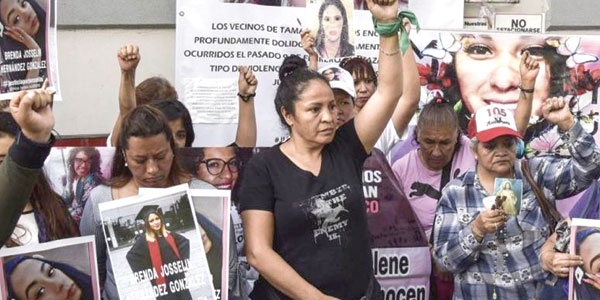
By Jorge Ramos
MOST WOMEN’S ATTACKERS REMAIN FREE WHILE THE MEXICAN GOVERNMENT DOES NEXT TO NOTHING TO PREVENT AND PUNISH GENDER VIOLENCE.
MIAMI — María de Jesús Jaime Zamudio, also known as Marichuy, died a week after falling from the fifth floor of the building in Mexico City she lived in, in the night between Jan. 15 and 16, 2016. Her mother, Yesenia Zamudio, has never believed the fall was an accident or a suicide attempt, as the local authorities suggested at the time of the tragedy. For the past four years she has insisted that her daughter was murdered.
In September 2019, Marichuy’s case was reclassified as a femicide. That makes her yet another woman among the thousands regularly killed in Mexico as a result of gender-related violence. Nothing is being done about this sad state of affairs. The attackers, for the most part, remain free.
“What I know now, from the experts’ analyses and investigations, is that Mary was a victim of gender-based violence. She was assaulted,” Yesenia told me about her daughter’s death during an interview. “She fell. No one helped her. Then, they left her to bleed out.” Marichuy, who was only 19, died in a Mexico City hospital from the multiple fractures sustained as she tried to escape her aggressors. Her family maintains that one of Marichuy’s college professors and three classmates assaulted her in her apartment after a night out, but so far no arrests have been made related to her case.
Yesenia recently gained some notoriety thanks to a video that went viral on social media. “So, what if I set things on fire, wreak havoc and raise hell in this city? What’s the problem with that?” she says in the video. “They killed my daughter! I’m a mother whose daughter was killed! And yes, I’m an empowered, feminist mother, and I have had enough. I have every right to burn down and destroy whatever I want, and I’m not going to ask for anyone’s permission. Because before they murdered my daughter, they murdered many, many others.”
The video was taken during a protest that Yesenia and other women staged in front of the building where another young woman, Ingrid Escamilla, was recently murdered. The body of the 25-year-old victim was found dismembered, and her male partner was accused of the brutal crime. The publication by several news outlets of a series of photographs showing the woman’s bloodied corpse elicited strong criticism of the media, accused of exploiting and further violating the victim’s memory, and of the government of Mexico City for its role in the leak of the images.
Yesenia’s anger, so public and digital, is the expression of a new culture against silence and machismo taking root in Mexico, a culture in which women are demanding equal treatment. Still, stopping the killings remains the priority. And even in that endeavor, with their demands and protests, women are taking the lead. On Sunday a massive march against gender-based violence will take place in Mexico City, followed the next day by a rare nationwide women’s strike, promoted under the hashtag #UnDíaSinMujeres (#OneDayWithoutWomen) on social media.
Femicide is the murder of a woman simply because she’s a woman. To classify a crime as a femicide, Mexico’s federal criminal code requires that the victim “displays signs of sexual violence,” or the existence of previous threats, evidence of harassment, a history of violent episodes, a romantic relationship, the deprivation of the victim’s freedom or the forced exposure of a person’s body in a public place.
In 2019, 1,010 femicides were registered in Mexico by the local authorities, more than double those reported in 2015. The problem is that in many cases women’s murders are simply classified as homicides. And since the vast majority of homicides in Mexico aren’t investigated, that category is like a mass grave.
As of the end of January, 40,299 Mexicans had been killed since Mexico’s president, Andrés Manuel López Obrador, also known as AMLO, took office on Dec. 1, 2018. These are the highest figures ever recorded in the country.
The rise of femicides has contributed to the end of Mr. López Obrador’s nearly 15-month honeymoon period in office, and it has created one of the first true challenges to his government. Sometimes it seems that AMLO, whose approval rate has fallen sharply in recent months, doesn’t know what to do about the issue. Many Mexicans wonder if he has the capacity and a solid plan to face one of the country’s most serious problems: the crime culture that has been pervasive in Mexico for decades.
In a 2017 interview, I asked Mr. López Obrador if he was a feminist. Eluding my question, he told me, “Women deserve to go to heaven.” AMLO showed that same ambiguity at a recent news conference, when he recited a vague decalogue of good intentions to confront femicide. “You have to respect women” and, “Machismo is an anachronism, an act of brutality” were among the entries. During another meeting with the press, when a female reporter asked him about his plan to reduce the number of murdered women, he assured her that they were “addressing the causes,” only to fall back into his empty rhetoric right after. “May there be lots of love and no hate,” he said.
That same day, the president said that there was no impunity in Mexico. But that is not true: Ninety-three percent of crimes in Mexico went either unreported or uninvestigated in 2018, according to a survey by Mexico’s statistics agency. This is why the proposal put forward by several nonprofits and activists for the creation of a prosecutor’s office specialized in crimes against women is a step in the right direction.
In February, after protesters spray-painted slogans against gender-based violence over the facade of the National Palace, President López Obrador asked the feminist groups staging the action to refrain from “painting the doors” of the building, in which he lives and works.
Yesenia, Marichuy’s mother, has other plans. “We don’t want to paint your door, sir, we want to kick it down,” she said during our interview. “We want you to listen to us.” And then, almost resigned to the fact that the government won’t take action, she launched a message to other women: “Just as an act of rebellion, let’s stay united. Let’s protect each other. Let’s love each other. And let’s take care of our daughters and our sons, because this government doesn’t care about us.”
She knows that, in Mexico, women are killed, and nothing is ever done about it.
________________________________________________________________________________________
En México matan mujeres y no pasa nada
EL GOBIERNO MEXICANO NO HA HECHO LO SUFICIENTE PARA FRENAR EL AUMENTO DE FEMINICIDIOS EN EL PAÍS. LOS AGRESORES, EN SU MAYORÍA, ESTÁN LIBRES Y NO SE VE UN PLAN CONCRETO PARA DETENER ESTA TENDENCIA.
MIAMI — María de Jesús Jaime Zamudio, conocida como Marichuy, murió una semana después de caer de un quinto piso en enero de 2016. Su madre, Yesenia Zamudio, está convencida que no fue un accidente ni un intento de suicidio, como sugirieron las autoridades en el momento de la tragedia. Durante los últimos cuatro años ella ha insistido en que su hija fue asesinada.
En septiembre de 2019, el caso de Marichuy fue reclasificado como feminicidio. Esto la convierte en una de los miles de mujeres que son asesinadas en México por violencia de género. Y no se ha hecho nada para solucionar este lamentable estado de las cosas. Los agresores, en su mayoría, están libres.
“Lo que ahora sé, por los peritajes y las investigaciones [es que] Mari sufrió violencia de género, sufrió acoso sexual”, me dijo Yesenia en una entrevista. “Cayó. Nadie la ayudó. Después la dejan en el olvido, desangrándose”. Marichuy, de sólo 19 años, murió por múltiples fracturas en un hospital de Ciudad de México por intentar escapar de sus atacantes. Su familia afirma que uno de los profesores de Marichuy y tres compañeros de la universidad la agredieron en su apartamento después de una noche de fiesta, pero hasta ahora no se han realizado arrestos relacionados con su caso.
Yesenia se dio a conocer recientemente por un video que se hizo viral en las redes sociales. “Y si quemo y rompo y hago un pinche despadre en esta ciudad, ¿cuál es su pinche problema?”, se le escucha decir. “¡A mí me mataron a mi hija! […] ¡Yo soy una madre que me mataron a mi hija! Y, sí, soy una madre empoderada y feminista y estoy que me carga la chingada. Tengo todo el derecho a quemar y a romper. No le voy a pedir permiso a nadie. […] Porque antes de que asesinaran a mi hija han asesinado a muchas”.
Yesenia dio este mensaje durante una protesta en la que muchas mujeres se reunieron frente al lugar donde mataron recientemente a Ingrid Escamilla. El cuerpo de Ingrid, de 25 años, fue encontrado descuartizado y su pareja fue acusada del brutal crimen. La publicación de fotos del cadáver ensangrentado de la víctima ocasionó fuertes críticas contra medios de comunicación —por explotación y revictimización— y contra el gobierno de Ciudad de México, por la filtración de las fotos.
La rabia de Yesenia, tan pública y digital, es la expresión de una nueva cultura en México contra el silencio, contra el machismo. Es una cultura en la que las mujeres exigen un trato igualitario. Pero, primero, es indispensable que no las maten. Y son las mujeres quienes están tomando la iniciativa a fuerza de denuncias y protestas. Este domingo 8 de marzo habrá una marcha multitudinaria en Ciudad de México y el lunes se convocó a una inusual protesta nacional conocida en las redes sociales como #UnDíaSinMujeres.
En 2019 se registraron 1010 feminicidios en México, más del doble de los reportados en 2015. El feminicidio es el asesinato de una mujer por el simple hecho de ser mujer. Pero para clasificar como un feminicidio un crimen, el código penal federal de México requiere que se presente alguna de estas circunstancias: que la víctima “presente signos de violencia sexual”, que hayan existido amenazas, acoso, antecedentes violentos, una relación sentimental o de confianza con el agresor, privación de libertad o la exposición de la víctima en un lugar público. El problema es que muchos asesinatos de mujeres al final caen en la categoría general de “homicidios dolosos”. Y en México esa categoría es como una fosa común: la mayoría de los homicidios no se investigan.
Desde que Andrés Manuel López Obrador es presidente —el primero de diciembre de 2018— y hasta el 31 de enero de 2020, han sido asesinados 40.299 mexicanos y mexicanas. Estás son las cifras más altas desde que se lleva registro de la violencia en el país.
Sin duda, esta violencia y el auge de los feminicidios terminó con la luna de miel de casi 15 meses que tuvo López Obrador y ha creado la primera gran crisis en su gobierno. A veces da la impresión de que AMLO, cuyos niveles de aprobación han caído al punto más bajo desde que llegó al poder, no sabe qué hacer. Y muchos mexicanos se preguntan si tiene la capacidad y un plan concreto para enfrentar el problema más grave que tiene el país: el crimen que abruma desde hace décadas a México.
En 2017 le pregunté a López Obrador si era feminista. Eludiendo la respuesta, me dijo: “Las mujeres merecen ir al cielo”. AMLO mostró esa misma ambigüedad en una reciente conferencia de prensa cuando recitó un vago decálogo de buenas intenciones para enfrentar los feminicidios. “Se tiene que respetar a las mujeres” y “el machismo es un anacronismo, un acto de brutalidad”, son parte de la lista. En otra Mañanera, como se les conoce a sus conferencias de prensa matutinas, una reportera le preguntó si tenía un plan puntual para reducir los asesinatos de mujeres y él aseguró que se estaban “atendiendo las causas”, pero después volvió a caer en lugares comunes: “Que haya mucho cariño, que no haya odios”.
Ese mismo día el Presidente dijo que en México no había impunidad. Pero eso no es cierto: en 2018, el 93 por ciento de los delitos en México no fueron denunciados o investigados, según el Instituto Nacional de Estadística y Geografía (INEGI). Es lo que se conoce como “cifra negra”. Por lo mismo, la propuesta de varias organizaciones civiles de crear una fiscalía especializada en investigar delitos contra las mujeres sería un buen primer paso.
En febrero, después de una serie de protestas en las que manifestantes pintaron consignas contra la violencia de género en la fachada del Palacio Nacional, López Obrador le pidió a los grupos feministas que no pintaran las puertas del edificio, en el que vive y trabaja.
Pero Yesenia, la madre de Marichuy, tiene otra idea. “No queremos pintar su puerta, se la queremos tirar, señor. Queremos que nos escuche”, dijo. Y luego, casi resignada ante la falta de acción gubernamental, lanzó un mensaje a otras mujeres: “Por pura rebeldía, vamos a estar unidas. Vamos a querernos. Vamos a protegernos. Y vamos a cuidar a nuestras hijas y a nuestros hijos porque a este gobierno no le interesamos”.
Ella sabe que en México las matan y no pasa nada.









